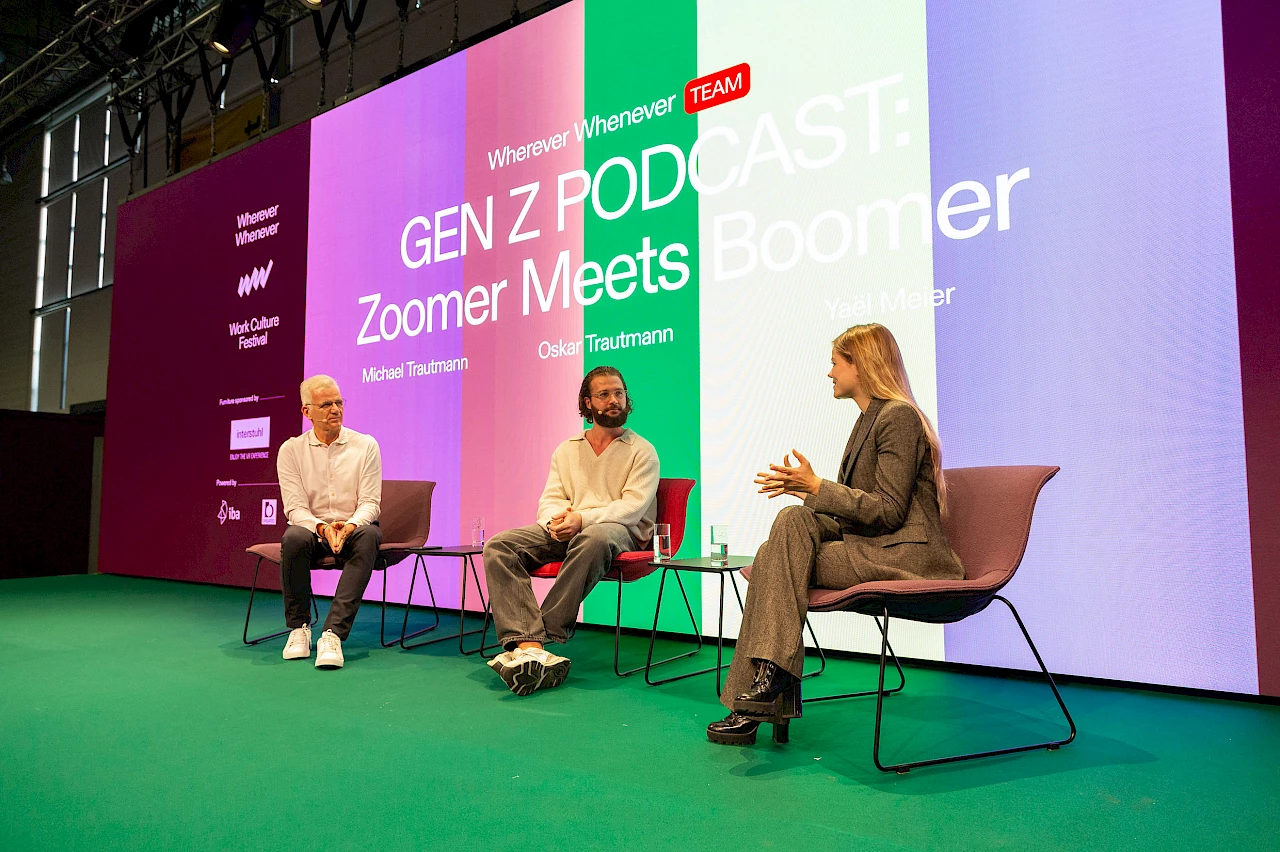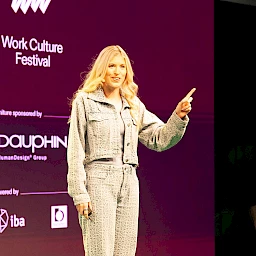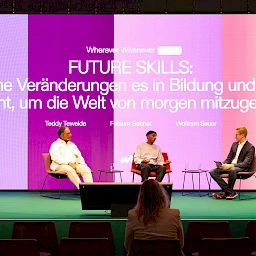Generation Z and the Boomer generation came together at the Work Culture Festival in a special exchange format. Yaël Meier opened the discussion with a keynote speech on the living environment of Gen Z, after which she spoke with Michael and Oskar Trautmann in the live podcast “GEN Z Podcast: ZOOMER Meets BOOMER”. Their conclusions: These generations have more in common than divides them, and dialogue is the key to better collaboration.
Generation Z — innovative, self-confident and more in demand than ever
Yaël Meier pointedly recalled the beginnings of Facebook and TikTok. These platforms were initially ridiculed before they revolutionised communication. According to her, a development that is dismissed as a toy today could lead to disruption tomorrow. Young people are often drivers of innovation. Digital identities, for example using avatars or virtual goods such as sneaker filters, are part of everyday life and an expression of individuality for Generation Z. Companies that take this innovative strength seriously benefit — as Gucci has impressively demonstrated with its “Shadowboard”. But Meier also addressed the difficulties. In Germany, the number of young professionals leaving the labour market increased in 2019, with fewer young talents taking their place. Gen Z is aware of its market value and demands prospects, appreciation and responsibility.
Work that has meaning and gives people a voice: Generation Z and the love-job model
The presentation focused on the love-job model. It showed which factors are decisive for Generation Z when it comes to choosing a job and retaining loyalty to a company. An appropriate salary is still important, but development prospects and transparent, fair remuneration models with variable components are becoming increasingly important. Appreciation within a company is particularly so. Studies show that a significant proportion of young employees feel that they are not taken seriously — around 72% report age-related discrimination. They therefore want a working environment in which their voices count. Regular, constructive feedback, ideally monthly instead of just once a year, as well as genuine opportunities to help shape the company have become a basic requirement for many. Dialogue-oriented management approaches such as coaching at eye level are also increasingly in demand. The external perception of the employer is also gaining in importance. After all, how a person’s working environment is received in his or her social environment has a significant impact on a person’s identification with an employer. Platforms such as TikTok or LinkedIn are used specifically to find out about a company’s corporate culture. Credible, cutting-edge employer branding that makes the values of the younger generation visible can be of decisive importance.
The physical office as a cultural anchor
Despite the flexibility of remote working, a company’s physical office remains a key place for fostering corporate culture, a sense of belonging and social dynamism. Yaël Meier describes the concept of her “trophy office” as a symbol of a new identity — people are proud to have an office. Not out of a sense of duty, but because it offers real added value. The office thus becomes a visible expression of identification with a company. Today’s working environments are more closely geared to the reality of employees’ lives. Rooms that feel like a second home offer retreats for concentrated work as well as open meeting zones for informal exchanges. Those looking for conversation and creativity can meet for coffee in the lounge, while those in need of peace and quiet can retreat. This flexibility meets the different needs of a diverse team.
However, it is not only the physical space that is decisive but also the interpersonal space. A good office creates an atmosphere in which collaboration is possible on an equal footing, regardless of age, background or function. At ZEAM, for example, the company run by Yaël Meier and Jo Dietrich, the team is deliberately composed of people with very different personalities who would probably never have met had they not been brought together by their joint work. Despite all their differences, they are united by a common spirit, a positive energy with which they all work towards the same goals. This understanding of teamwork is part of their corporate philosophy: ZEAM wants to bring “young thinking” into companies — consistently implemented by only hiring people who are younger than the founders themselves. The result is a working culture in which new perspectives are a matter of course and diversity is not only accepted, but actively encouraged. In this context, the physical office becomes a stage for encounters and innovation and a place where corporate culture not only manifests itself, but comes to life.
Leadership means listening and learning from each other
One conclusion from Yaël Meier’s presentation and the subsequent generation conversation was that good cooperation is not achieved through more control, but through more mutual understanding. Leadership is being rethought today: less hierarchical, more empathetic, more dialogue-oriented and more open to new viewpoints. All generations have something to contribute. The older employees contribute experience, vision and structured thinking. The younger ones demand meaning, attitude and speed. It is precisely this diversity that harbours enormous potential, provided that people are willing to learn from one another. This not only requires young employees to be involved, but also given responsibility. Conversely, the younger generation should look at existing experiences with curiosity and be prepared not only to challenge, but also to listen. So the question is not who is right, but how to complement each other. This requires openness and trust on both sides. Companies that take this seriously create spaces in which cross-generational collaboration succeeds: through honest communication, state-of-the-art leadership and a culture in which diversity is seen as a strength.
What does it take? Attitude — and implementation
- Not talking about young people, but with them.
- Delegating responsibility, even if it is sometimes uncomfortable to do so.
- Redefining leadership: as co-creation, not dictation.
- Understanding team diversity as the normal, not as a special case.
- Making shared values visible and putting them into practice.
Ultimately, the future of work isn’t about age; it’s about collaboration. Or, to use the words of Yaël Meier: “Do it!” Not in theory, but in practice. After all, good collaboration begins precisely where people listen to each other, take each other seriously and want to shape things together.






